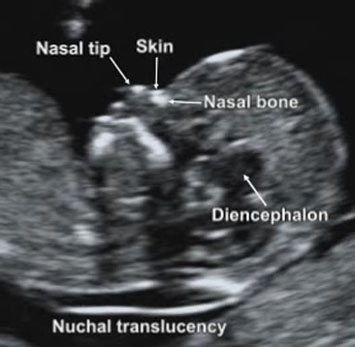Down syndrome can be diagnosed almost as soon as a baby is born, based on distinctive physical characteristics that prompt immediate testing. Down syndrome can also be diagnosed, or at least suspected, based on any of several prenatal tests.
Modern imaging techniques can provide very detailed pictures of what’s going on inside of the body, including features of a still-developing fetus. Since many characteristics of down syndrome are visible, it’s possible to pick up on some of them in an ultrasound before a baby is born.
Nuchal Translucency Ultrasound Screening
This specialized ultrasound, which is performed at 11 to 13 weeks, measures the thickness of an area of tissue at the back of a fetus’ neck called the
nuchal fold. Though this test is recommended for all pregnant women, this is a difficult measurement to obtain and only someone who has been specifically trained and certified to perform this screening can do it.

In general, a measurement under 3 millimeters is considered normal and one that’s over 3 mm is considered abnormal. In the latter case, it will be important to meet with a genetic counselor to discuss your screening results, what they mean, and your diagnostic testing options such as chorionic villi sampling (CVS) or amniocentesis.
Ultrasound (Sonogram) Screening
Ultrasounds work by using sound waves to generate an image of the fetus. These waves pose no risk to mother or baby. The standard ultrasound is done between 18 and 22 weeks of pregnancy and can reveal a variety of physical characteristics that are associated with an increased risk that a developing baby has down syndrome.
The doctor will rub a special gel on your abdomen and then slide a transducer, a wand-like apparatus that transmits sound waves into your abdomen, over your belly. The sound waves travel through the amniotic fluid, deflecting off structures located in the uterus. The speed at which the waves bounce back differs depending on the density of what they hit. A computer turns this information into an image of the fetus. The harder or denser a structure is, the brighter it will show up on the monitor.

Occasionally, but not always, infants with down syndrome show subtle signs, called soft markers, on an ultrasound that suggest they may have down syndrome:
- A shorter-than-normal femur (thigh) bone
- A missing nose bone in the first trimester
- Duodenal atresia
- Certain heart defects
- Gastrointestinal blockages
These signs do not mean that a baby has down syndrome for sure. Again, further testing is needed to confirm the diagnosis. Likewise, it is important to note that most fetuses with down syndrome show no abnormalities on ultrasound, which can be falsely reassuring to parents who are especially concerned about this disorder.
If a prenatal screening test indicates there’s a possibility your child will have down syndrome or if you have risk factors for having a child with the disorder, then you may be faced with taking the next step and confirming the diagnosis. It can be helpful to ask yourself very specific questions about whether prenatal testing to confirm a diagnosis of down syndrome is the right thing for you and your family. Be open about your thoughts when speaking with your doctor and know that getting a diagnostic test is entirely your choice.
Reference:
https://www.verywellhealth.com/diagnosing-down-syndrome-1120396
















